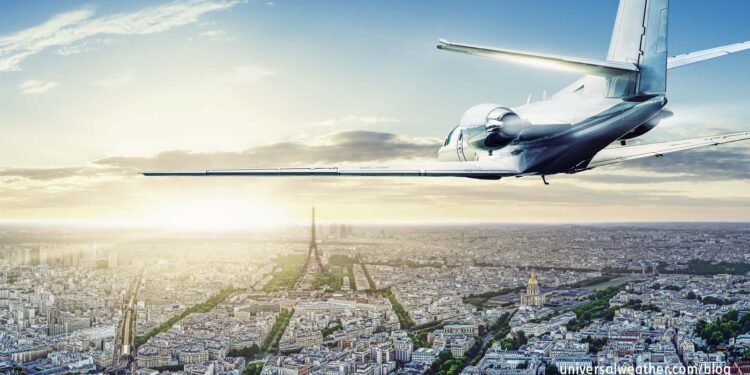Flying to Paris for the UN Framework Convention on Climate Change

This is a post by author Sandrine Jackson. Sandrine is managing director for Universal Aviation France – Paris, which has a recently renovated FBO with hangar at Le Bourget Airport. Sandrine is an expert on business aircraft operations in France and can be contacted at sandrinejackson@universalaviation.aero.
The Paris Climate Change Conference, as part of the United Nations Framework Convention on Climate Change (UNFCCC), takes place in Paris, November 30 – December 11. Venue for this event, with meetings and events running 24/7 during this 12-day period, is the convention facility at Le Bourget (LFPB). This conference will attract a great deal of general aviation (GA) activity. If you are planning on being in Paris during this time, it’s recommended to secure aircraft parking, services and crew hotel accommodations as early as possible.
The following is an overview of what you need to know:
1. Primary airport
As the conference takes place at LFPB, this is the preferred and most convenient airport for GA. LFPB is a 24-hour airport of entry (AOE) with 24/7 customs, immigration, and quarantine (CIQ) clearance, full services, support and plenty of parking. Note however that even though this is a 24-hour airport, no departures are permitted 2200-0600 local. Due to the high volume of GA aircraft this conference will draw to the Paris area we expect that there may be parking issues. There’s a possibility, not confirmed at this moment, that wide-body aircraft may not be accepted during the event period. Additionally, operators must be mindful that special advance accreditation must be obtained for all GA operations to Paris area airports during the November 30 – December 15 timeframe.
2. Alternate airports
Orly (LFPO) and Charles de Gaulle (LFPG) normally do not allow GA to land or park , unless it’s to drop off/pick up from a scheduled commercial flight or if the flight is a qualifying diplomatic operation. In the case of the UNFCCC many attendees will be part of diplomatic missions and will have the ability to park at LFPO or LFPG. Two other alternates to consider are Pontoise (LFPT) and Lille (LFQQ). LFPT is not an AOE, has daily operating hours of 0800-2000 local, limited parking and services, and is a one and a half hour drive from central Paris. Overtime may be possible at LFPT during the convention period, but will not be advised until closer to the event. LFQQ is a full service 24-hour AOE, but it’s 114 nautical miles from LFPB, a two hour plus drive.
3. Permits, airport slots and PPRs
Landing permits for France are only required for charter (non-scheduled commercial). Lead times for charter permits vary, depending if you have a complete foreign operator’s questionnaire (FOQ) on file with the Civil Aviation Authority (CAA). First time charter operators to France should anticipate permit lead time of four to five business days considering that no additional documentation or clarification is needed. For charter operators with FOQs on file, the lead time is generally two to three business days. LFPB does not normally have prior permission required (PPR) or airport slot requirements but it’s possible that slot restrictions may be imposed during the UNFCCC event period. Note that both LFPG and LFPO have PPR and airport slot mandates in place. Lead time of 24 hours is normally suggested for PPR and slot requests, but additional prior notice may be needed during this event, due to high demand by diplomatic flights.
4. Accreditation requirements
Advance accreditation is required for all GA operations to Paris area airports from November 30 through December 15, regardless if you’re attending the conference or visiting Paris for another purpose. All accreditation requests need to be submitted by November 22 and its unknown at this time if short notice requests will be accepted. Information that needs to be submitted in advance, for accreditation purposes, includes full pilot details, copies of valid passports, pilot licenses, and aircraft certificate of airworthiness. Note that no accreditation is required for November 24-28 only between 1130-1530 local, but authorities have not clarified yet what will be required during this time frame. More information on this will be known downline.
5. Drop and goes
Operators will be permitted to drop and go at LFPB during the conference period, but advance accreditation is still required. Be mindful, however, that LFPG and LFPO do not normally allow GA drop and go, unless passengers are connecting to scheduled commercial flights. This restriction will not likely impact diplomatic flights.
6. CIQ clearance
LFPB CIQ clearance is done at the fixed-base operator (FBO) and is normally a quick process. Required documentation includes full names, dates of birth, nationality, and passports with valid expiration dates. Security screening will be in place for both arrivals and departures, and there could be additional screening by police. While departure CIQ clearance is not necessary in France, CIQ authorities reserve the right to conduct departure checks for any aircraft. When arriving in Paris from outside Europe, Schengen visas may be required depending upon nationality. If you do not have required visas prior to arrival you’ll not be permitted into the country. Intra-EU flights are not usually subject to CIQ clearance on arrival. However, immigration, at their discretion, may choose to check, so be prepared for possible delays. For more information on visa requirements see the UN Climate Change Conference website.
7. Fuel and aircraft services
GA aircraft services will be in high demand over the conference period, so it’s best to request all required services such as fuel uplifts and in-flight catering as early as possible. Some operators may choose to uplift fuel the day prior to departure in order to minimize delays on the day of operation.
8. Hotel and local transport considerations
Hotel accommodations will be in high demand over the conference period, and many hotels have already been blocked by the UN for delegates. Anticipate higher room prices, lack of availability at preferred hotels, and the possibility of having to travel outside the city to source short notice crew accommodations. For local travel it’s best to arrange prepaid transport (car with driver) as early as possible. Public taxis are expected to be in very high demand, and delays on congested streets and highways should be anticipated.
9. NOTAMs and AIPs
Although NOTAMs for this event are unknown at this time they’re likely to be issued due to the unique and busy nature of this conference. Airport Information Publication (AIP) notice was published and more information can be found on the French DGAC website. We anticipate heightened security measures and screening to be in place throughout the Paris area during the meeting period. Note that the UN will have control over the LFPB convention area, with their own security requirements and restrictions. With so many aircraft, passengers, and diplomatic convoys involved with this event, operational delays will be likely at times.
Conclusion
There are several key considerations operators planning on flying to the Paris area during this time period should be mindful of. It’s particularly important to be aware of the accreditation process that will be in place for all area airports, as well as potential parking restrictions and crew accommodation challenges.
Questions?
If you have any questions about this article or would like assistance planning your next trip to France, contact me at sandrinejackson@universalaviation.aero.




